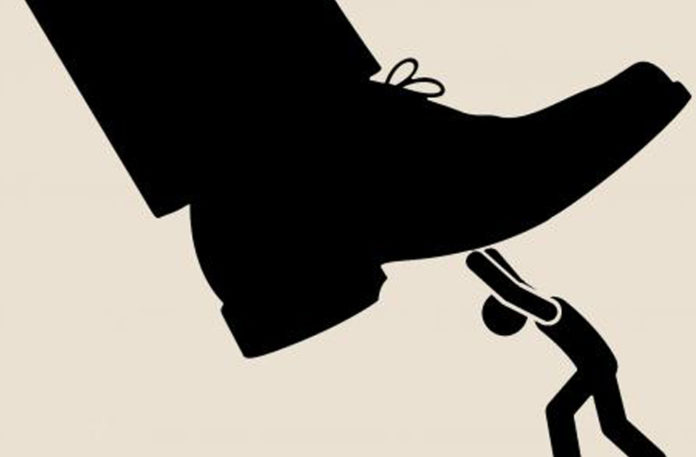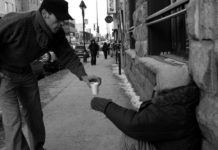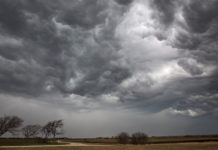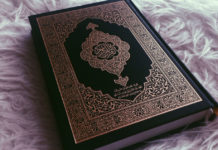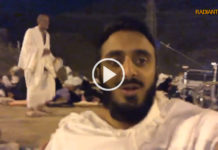يا عبادي ! كلكم ضال إلا من هديته ، فاستهدوني أهدكم .
يا عبادي ! كلكم جائع إلا من أطعمته ، فاستطعموني أطعمكم.
يا عبادي ! كلكم عار إلا من كسوته ، فاستكسوني أكسكم .
يا عبادي ! إنكم تخطئون بالليل والنهار ، وأنا أغفر الذنوب جميعا فأستغفروني أغفر لكم .
يا عبادي ! إنكم لن تبلغوا ضري فتضروني ، ولن تبلغوا نفعي فتنفعوني .
يا عبادي ! لو أن أولكمم وآخركم وإنسكم وجنكم كانوا على أتقي قلب رجل واحد منكم ، ما زاد ذلك في ملكي شيئًا .
يا عبادي ! لو أن أولكم وأخركم وإنسكم وجنكم كانوا علي أفجر قلب رجل واحد منكم ، ما نقص ذلك من ملكي شيئًا .
يا عبادي ! لو أن أولكم وأخركم وإنسكم وجنكم قاموا في صعيد واحد ، فسألوني ، فأعطيت كل واحد مسألته ، ما نقص ذلك مما عندي إلا كما ينقص المخيط إذا أدخل البحر .
يا عبادي ! إنما هي أعمالكم أحصيها لكم ، ثم أوفيكم إياها ؛ فمن وجد خيرًا فليحمد الله ، ومن وجد غير ذلك فلا يلومن إلا نفسه ).
رواه مسلم [ رقم : 2577 ]
On the authority of Abu Dharr al-Ghifaaree (radiAllahu anhu) from the
Prophet (sallAllahu alayhi wa sallam) from his Lord (‘azza wa jall)
that He said :
| O My servants ! I have forbidden dhulm (oppression) for Myself, and I have made it forbidden amongst you, so do not oppress one another. O My servants, all of you are astray except those whom I have guided, so seek guidance from Me and I shall guide you. O My servants, all of of you are hungry except those whom I have fed, so seek food from Me and I shall feed you. O My servants, all of you are naked except those whom I have clothed, so seek clothing from Me and I shall clothe you. O My servants, you commit sins by day and by night, and I forgive all sins, so seek forgiveness from Me and I shall forgive you. O My servants, you will not attain harming Me so as to harm me, and you will not attain benefiting Me so as to benefit Me. O My servants, if the first of you and the last of you, and the humans of you and the jinn of you, were all as pious as the most pious heart of any individual amongst you, then this would not increase My Kingdom an iota. O My servants, if the first of you and the last of you, and the humans of you and the jinn of you, were all as wicked as the most wicked heart of any individual amongst you, then this would not decrease My Kingdom an iota. O My servants, if the first of you and the last of you, and the humans of you and the jinn of you, were all to stand together in one place and ask of Me, and I were to give everyone what he requested, then that would not decrease what I Possess, except what is decreased of the Ocean when a needle is dipped into it. O My servants, it is but your deeds that I account for you, and then recompense you for. So he who finds good, let him praise Allah, and he who finds other than that, let him blame no one but himself. |
It was related by Muslim.
Explanation of Hadeeth Number 24
This hadeeth is a hadeeth where the Prophet sallAllahu alayhi wa sallam
narrates something from Allah ta’aalaa, and is referred to as a
‘Hadeeth Qudsee’.
Regarding His ‘azza wa jall statement “I have forbidden dhulm (oppression) for Myself, and I have made it forbidden amongst you”, some of the ‘ulamaa have said thats its meaning is : “it does not befit My Majesty and hence is not possible for Me”, as Allah ta’aalaa has said : “But it is not befitting of (the Majesty of) the Most Beneficent (Allah) that He should beget a son”. So dhulm is inconceivable in respect of Allah ta’aalaa. And some of the ‘ulamaa have said regarding this hadeeth : “It is not permitted for anyone to ask Allah to Judge against his adversary except with the Truth, from His – suhaanahu – saying : “I have forbidden dhulm for Myself”, so He – subhaanahu – does not oppress His slaves of His own accord, so how can anyone conceive that He would oppress one of His slaves for the sake of another one of His slaves ?”
And similarly He said : “so do not oppress one another” and this implies that the oppressed will he avenged for the oppression committed against him.
And His statement “all of you are astray except those whom I have guided … all of of you are hungry except those whom I have fed … all of you are naked except those whom I have clothed” is a reminder of our poverty before Allah, and our inability to bring about good for ourselves and to fend off harm from ourselves, except by the Help of Allah subhaanahu in that, and this returns to the meaning of the statement : ‘laa howla wa laa quwwata illaa billaah’, ie ‘there is no movement or power except by the Will of Allah’. So let the slave know that when he sees the
traces of these blessings upon himself then this is from the blessing of
Allah, and so it is necessary for him to thank Allah ta’aalaa for
that. And for every thing that he receives in excess of these blessings
he should increase in Praise and Thankfulness of Allah ta’aalaa.
And His statement : “so seek guidance from Me and I shall guide you”, then this generally informs the slave that when he sought guidance from his Master, then He guided him. And even if he received guidance before he asked for it from his Lord, then he still cannot say that he attained guidance by knowledge that he possessed. And similarly the meaning of “all of of you are hungry …” till the end, is that Allah has created all of creation in a state of poverty and need of food. So every one who eats was in a state of hunger until Allah fed him, by sending his rizq (sustenace) to him and perfecting the favours that had been shaped for him. So let not the possessor of wealth think that the sustenace which he holds in his hand and which he has raised to his mouth has been provided to him by anyone other than Allah ta’aalaa. And in this statement also is an indication of the required manners of the needy – as though He said : “Do not seek sustenance from anyone other than Me, for verily all those others from whom you might seek sustenance have themselves been provided for by Myself. So seek sustenance from me and I will provide for you”, and similarly for that which follows this.
And His statement “you commit sins by day and by night” contains a censure against that [sins] which every believer feels ashamed of. For Allah has created the night to be obeyed in, and to be worshipped
sincerely in, as the deeds performed in the night are generally safe
from riyaa’ (ostentation) and hypocrisy. So does not the Believer feel
ashamed that he does not spend his nights and days in the obedience of
Allah ? And also, Allah has created witnesses from amongst mankind
too, so what is expected of every intelligent and astute person is that
he will obey Allah, and will not openly display disobedience in front
of the people. And how can it be that a Believer would sin whether
openly or secretly, for verily Allah subhaanaha wa ta’aalaa has said
after that : “and I forgive all sins”. And in the arabic of this statement are two forms of emphasis which indicate that Allah will forgive all forms of sin. And He said this before His order to seek forgiveness from Him, so that no one who has committed a sin may despair of the Mercy of Allah, no matter how great that sin may be.
And in His statement “if the first of you and the last of you, and the humans of you and the jinn of you” until the end, is an indication that the taqwaa (piety) of the pious is a Mercy granted to them, and that it does not affect or increase the Kingdom of Allah in the least.
And as for His statement “… were all to stand together in one place” then in it is an exhortation to the creation to lay importance upon asking Allah and to seek from Him in all affairs, and not to feel shy or decrease in asking Him, for verily that which is with Allah does not decrease and His treasures are inexhaustible, so let not anyone think that what is with Allah will diminish by His giving, as the Prophet sallAllahu alayhi wa sallam has explained in another hadeeth :
“Allah’s Hand is Full; it is not diminished by His giving all of the day and the night. Have you not seen that your Lord has been giving ever since He created the Heavens and the Earth, and all that has not diminished what is in His Right Hand by the least”. And what is hidden in this is that His Qudrah (Power, Ability) is always ready for bestowing favours upon His creation, and it is not possible that He lose the ability to do so, or that He decrease in doing so, or that what He is able to do becomes restricted.
And His statement “except what is decreased of the Ocean when a needle is dipped into it” is a metaphor, whose purpose is to make understood what we testify for Allah. And its meaning is that what is with Allah does not decrease at all.
And His statement “it is but your deeds that I account for you, and then recompense you for. So he who finds good, let him praise Allah” means that the slave should not consider his actions of obedience and worship of Allah as being the sole result or his own nafs (soul), but rather he should consider them to be the result of the tawfeeq (guidance, good fortune) from Allah, and hence he should Praise Him for that.
And He said “and he who finds other than that” and He did not say “and he who finds evil”; and the meaning of this is therefore “and he who finds anything other than that which is best”. Then, such a person should not blame anyone except himself. And Allah emphasises this through a nuance in the Arabic language, so that no person may think that there can be anyone else who partly or wholly bears resposibility for his actions.
And Allah knows best.
Summary :
- That Allah never oppresses
- That Allah cannot oppress
- That it is Haraam for us to oppress one another
- That nobody is guided unless he is guided by Allah
- That although the Guidance is to be found in the Qur’aan and the Sunnah, yet one cannot be guided by them unless Allah turns our hearts to His worship
- That it is incumbent upon us to seek His guidance
- That if we sincerely seek His guidance then He will indeed guide us
- That sustenace and provision is from Allah alone
- That we must seek sustenance and provision from Him Only
- That He will give us sustenance and provision if we ask it of Him
- That all of us are sinful to a greater or lesser extent, ie nobody is sinless
- That Allah forgives all sins except that which He says He does not forgive, and which He has mentioned
- That none can forgive sins but He
- That it is obligatory to seek His forgiveness for our sins
- That nobody can either harm or benefit Allah in the least
- That His Kingdom is not affected at all by all of mankind and jinn either becoming like the best among them or the worst among them
- If He were to give everyone what they requested from Him, then it would not decrease what He possesses of treasures and bouties
- That one will be judged on what he has done, so we must make sure our actions are always acceptable to Allah
- That action is part of Iman
- That we cannot be successful without His Guidance, Help, Protection and Mercy, so we should always praise Him for the good that we receive
- That we have no one to blame but ourselves if we end up in misery due to our bad deeds



